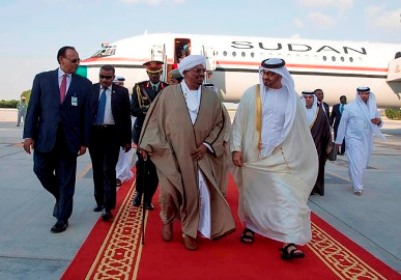Sudan, UAE agree to develop unified Arab strategy to face regional threats
November 28, 2015 (ABU DHABI) – Sudan and the United Arab Emirates (UAE) have agreed to coordinate efforts to develop a unified strategy in order to face the common challenges and maintain stability of the Arab World.

The meeting discussed development, economic and political cooperation between the UAE and Sudan and the keenness of the leadership in both countries to promote and develop bilateral relations to achieve the common interests.
The two sides also discussed several regional issues of common interest and the level of cooperation in tackling them.
They underscored the importance to develop bilateral ties particularly during this critical time in the history of the region which is facing serious challenges that threaten security and stability of its nations and peoples.
The meeting also discussed issues pertaining to Saudi-led coalition in Yemen and ways for restoring the legitimate government and supporting the Yemeni people to rebuild their national institutions which were destroyed by the Houthi rebels and their allies.
The Crown Prince has praised the efforts of the Sudanese troops in the coalition, pointing to its effective participation to achieve stability in Yemen and confront security challenges and regional ambitions which poses serious threat to the entire region.
Sudan is the only non-Gulf state to send troops to fight in Yemen alongside Saudi Arabia and UAE against Houthi rebels there.
Zaid stressed that his country seeks to strengthen the historical ties which were laid down by the late Shiekh Zaid bin Sultan with Sudan on the bases of joint brotherhood, cooperation and common interests.
He said they seek to achieve the mutual interests of the two peoples and to promote development, economic, trade and cultural cooperation.
Bashir, for his part praised the constructive role played by the UAE in supporting Arab issues particularly those pertaining to security, development and stability.
He expressed Sudan’s readiness to support all efforts to strengthen the Arabs unity and push forward the region to new horizons to achieve social and economic development.
The two sides emphasized the need to develop an Arab strategy to confront the challenges and concert efforts to maintain security and stability of the region.
They also stressed the importance to fight against extremism and terrorism and to eradicate the terrorist groups which seek to kill innocent people and wreak havoc and destruction.
The East African nation appears to have managed to achieve a breakthrough in ties with UAE after a long period of strained relations over Khartoum’s close ties with Tehran.
UAE is in a long-standing territorial dispute with Iran over the three Gulf islands of Abu Musa and Greater and Lesser Tunb.
Iran refuses international arbitration over the dispute and insists that its sovereignty over the islands is non-negotiable.
Last year, Sudanese authorities ordered the closure of Iranian cultural centre in the capital Khartoum, and other states in a move which was seen as gesture to the Arab Gulf states.
It should be mentioned that Bashir’s accompanying delegation included the foreign minister Ibrahim Ghandour, finance minister, Badr al-Din Mahmoud, minister of electricity and water resources, Muataz Musa, minister of the state at the presidency, Fadl Abdallah Fadul and the director of the office of the president, Taha al-Hussein besides several other officials.
(ST)
